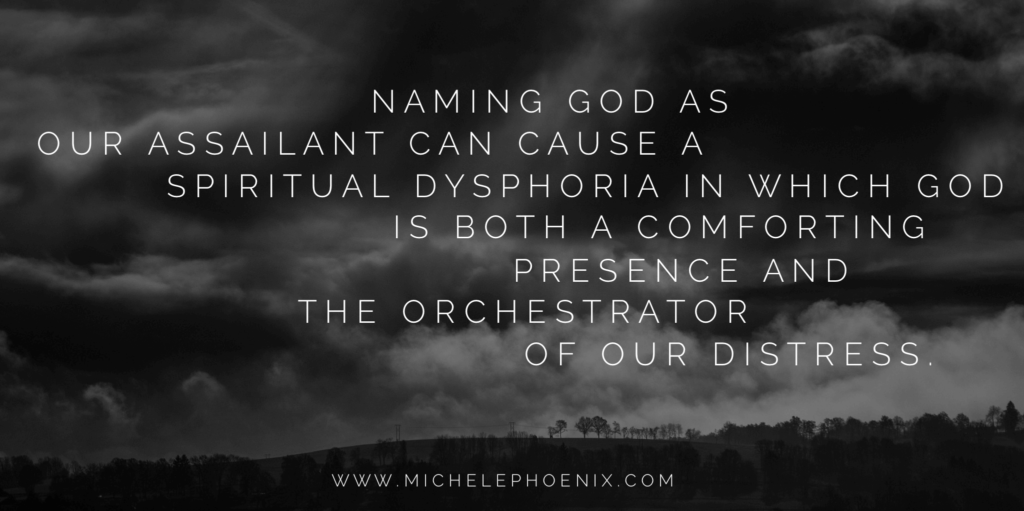[As published by Patheos. Don’t miss my Pondering Purple podcast, available on your favorite platform or from this Anchor page.]
I was leaving a conference room after a lengthy presentation when a woman I’d never met—I’ll call her Judy—came up to me and said, “God chose you for this storm. He knew it would give you a richer story to tell.”
She was referring to something I’d alluded to only briefly in my seminar, as a means to emphasize God’s power to console—the recurrence of breast cancer I’ve had to battle this year, which ended in life- and body-altering surgery.
Judy looked at me earnestly and kindly as she essentially stated that cancer was an affliction chosen by God, wrapped in divine motives and addressed directly to me.
I looked Judy in the face and lowered my voice as I leaned in, still grasping her hand.
“God didn’t cause this storm,” I said. “But he was in it with me.”
I quelled the impulse to add more to my response. It wouldn’t help—it never did. For the woman now looking at me uncomfortably, a trial on the scale of what I’d endured had to have been both intended and inflicted by God himself so I could bear a more convincing witness to his goodness.
That’s the problem with verbal placebos of imprecise theological origins—in an attempt to lend meaning to the unimaginable, we too often condense complex biblical concepts into sentence-long platitudes that do more to misrepresents God than to express the mercy, compassion and relational longing of his heart.

More dangerously, they can intentionally or unintentionally convey the message that God is not only in the storm, but the originator of the storm—that all pain, not just some pain, is God-inflicted.
God chose you for this disease to punish you.
God picked you to walk your child to her death so you would learn to trust him in the trauma.
God selected your marriage to be destroyed by infidelity because your trust in him would be an effective witness to others.
By using uncareful language in an attempt to bring spiritual clarity to contexts that are, at best, unfathomable to the human mind, we too often make of God the instigator of all storms, portraying him, as Judy did, as a self-aggrandizing tyrant who uses our pain to punish, teach or hijack our suffering for his greater glory.
As someone who is acquainted with pain—having endured abuse, years of depression and life-threatening illness—I can assure you that I’d be hard pressed to trust a god who was always the perpetrator of my torment.
Yet the Bible is filled with instances in which death and destruction were not his handiwork. Though his justice and discipline are sometimes meted out in painful ways, our suffering more often originates elsewhere:
The self-inflicted turmoil of flawed human beings like Adam and Eve, David and Judas.
The collateral damage from someone else’s sin endured by people like Tamar, Hosea and Paul.
The physical decay of illness and old age.
The maleficent pain of the devil’s targeted attacks.
The cataclysmic havoc of a groaning planet on which tectonic plates shift and oceans surge.
It may be our desperation to make sense of our pain that moves us to proclaim a divine actuating of the loss and trauma that maim and confound us.
Perhaps it’s also easier to pin the unexplainable on God rather than leave a question mark where we’d rather find certainty. Yet naming God as our assailant—particularly when stated to believers whose faith is more religion than relationship—can cause a sort of spiritual dysphoria in which God is both our comforter and the orchestrator of our distress.

The implications are trust-shattering when applied to the worst of life’s pain—the molestation of a child, the murder of innocents, widespread famine and deadly tsunamis. If we don’t measure the meaning of our God-words, we may unintentionally communicate that God willed all atrocities into existence so he can prove himself to be God.
Expecting those who are suffering to turn to that God for solace may be asking too much.
I didn’t remind Judy about Elijah’s story when she told me that God had inflicted cancer on me. I didn’t quote the six simple words in the biblical account that have brought me such comfort. Yet it is Prophet Elijah I go back to every time the enormity of what I’ve been through threatens my image of God as a loving and comforting Father. Every time the evening news covers an atrocity I can scarce fathom. Every time someone I know endures a loss that threatens to destroy her.
Elijah feared for his life when he fled to a cave on Mount Horeb. Then a storm of monumental proportions enveloped the mountain on which he’d found refuge. It’s right there in 1 Kings 19.
We’re told that winds strong enough to break rocks in two raged around him. But God was not in the wind.
The earth rocked and spasmed under his feet. But God was not in the quake.
When a fire consumed the mountain, scorching it with its power and intensity, God was not in the fire.
God was not in that storm.
Well-intended Christians might have seen nature’s bluster and declared to Elijah that God was the perpetrator of the wind, earthquake and fire—that he was punishing him for fleeing or ordering him to praise him with the display of force and fury. Yet when God speaks to the prophet, it isn’t in the raging storm. It’s from directly at his side, in a whisper only Elijah can hear.
He reveals himself intimately. Lovingly. Gently.
God is not in every storm.
He does not routinely injure us to teach us to praise him.
He does not indiscriminately slaughter us so our families learn to trust him.
He does not callously afflict us with diseases and death so our waning lives can bring glory to his name.
He does not rejoice in the atrocities, injustice, barbarity
and cataclysms that destroy us, and he certainly doesn’t
cause them to happen out of some tyrannical,
sadistic desire to hear us praise him from
the dungeons of our pain.
Yet we so often imply that he does. Imprecise God-talk yields harmful theology.
The truth I cling to when pain overwhelms me is this: God is in the business of redeeming our storms. He stands with us in them—just as he did with Elijah—comforting us, encouraging us and loving us in quiet tones despite the chaos raging around us.

When cancer threatened me again this year and stole so much from me, I had to cling to the certainty that God was not my tormentor. As well-meaning friends indicted his goodness in attempts to soothe my fears, I rejected their premise. He hadn’t caused this storm, but he was in it with me, defying its attempts to dismantle my faith.
Perhaps most importantly, I know that God will not allow my pain to have the final word. This is the truth that speaks serenity to me—the central message of my novel releasing soon. He will layer light over the darkness, good over the brokenness, and life eternal over death.
The God of Elijah will triumph in the end—the God of holy wrath and immeasurable goodness, who whispers comfort in our storms and loves us into peace.
~~~~~~
Related articles:
The Semantics of Grief
For the Hurting – Lessons from a Wall
Related novels:
The Space Between Words
Of Stillness and Storm
Please join the conversation!
-
- Contribute your thoughts in the comments section below
- Use the social media links to Like and Share this article
- Many of these articles are now available in podcast form. Simply search for “Pondering Purple” on your usual pod platforms, or click this link to be taken to its host page.
- To subscribe to this blog, email michelesblog@gmail.com and write “subscribe” in the subject line
- Pick up Of Stillness and Storm (my novel about a missionary calling gone awry) on Amazon


